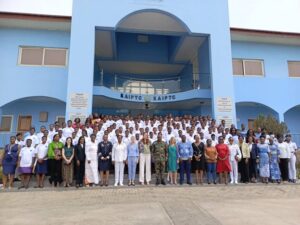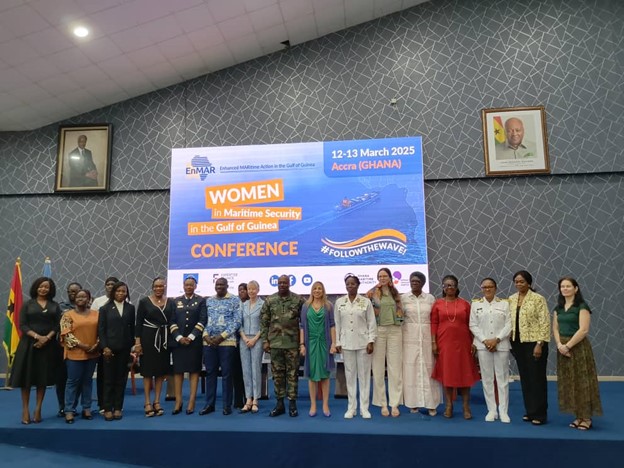…as women represent under 2% of global workforce
By Juliet ETEFE
Stakeholders in the maritime sector are intensifying calls for greater gender inclusion and women’s empowerment, particularly in the Gulf of Guinea maritime domain.
They stressed the need for gender perspective in addressing sectorial issues while citing the underrepresentation of women — who currently constitute less than 2 percent of the global maritime and port workforce — as a critical gap that must be addressed.
The call was made during the Conference on Women in Maritime Security in the Gulf of Guinea, held at the Kofi Annan International Peacekeeping Training Centre (KAIPTC) in Accra.
Organised under the Enhanced Maritime Action in the Gulf of Guinea (EnMAR) project, with funding from the European Union (EU), the conference convened high-level actors including maritime professionals, security officials, students, and women leaders to spotlight the gender gap in the sector and propose inclusive pathways for transformation.
Gender mainstreaming
Programme Manager for the EnMAR project, Marie Gibrat, noted that despite the progress made, the sector remains heavily male-dominated.
She recalled past training events, sharing how the absence of women in a training session for harbour masters triggered a deliberate shift in EnMAR’s approach to gender mainstreaming.
“Three months later, we requested that female officers be nominated to another training, and we were proud to see one-third of the participants were women—some traveling abroad for the first time for professional training,” she said.
Ms. Gibrat emphasised that empowering women in maritime security is not symbolic but necessary for operational efficiency stating that “Security can only be achieved if everyone is involved—both men and women”.
She stressed that diverse perspectives are essential to building a secure maritime world and encouraged young women to “follow the wave” of change being pioneered by women in the industry.
Ms. Gibrat also commended the partnership with the Network of Professional Women in the Maritime and Port Sector in West and Central Africa, which continues to spearhead advocacy and capacity-building for women in the sector.

Gendered perspectives
Commander of the KAIPTC, Major General Richard Addo Gyane, added to the call and underlined the importance of integrating gender perspectives into peace and security efforts, citing UN Security Council Resolution 1325.
He noted that despite the critical role of the Gulf of Guinea in global trade and energy supplies, maritime insecurity persists and disproportionately affects coastal communities—especially women.
“Women’s representation across the maritime sector is low. From the Navy through to ports and maritime administration agencies and the fishing industry, women face multiple challenges in terms of discrimination in certain roles, low representation and participation in decision making, sexual harassment, unsafe and hazardous work environments, among others.
“However, maritime security challenges including Illegal, Unreported and Unregulated (IUU) fishing, maritime piracy, human trafficking, maritime pollution among others negatively impacts women and their livelihoods.
“Addressing these maritime security challenges therefore requires a broad and inclusive approach. A diverse gendered perspective in the maritime space provides a relative advantage to ensuring a safer and secure maritime domain. It is therefore important to recognise and support women’s participation in the maritime sector as well as their contributions to a sustainable blue economy,” he emphasised.
In an address on his behalf, Director-General of the Ghana Maritime Authority (GMA), Dr. Kamal-deen Ali described the conference as a timely intervention that aligns with GMA’s strategy to create more opportunities for women in the sector.
He stated that “Maritime security cannot be complete without the active involvement and participation of women”.
Dr. Kamal-deen pointed out that the numerous security challenges call for a multidisciplinary and inclusive approach, with women’s perspectives being integral to both strategic and operational decisions.
He lauded the EU and other partners for their support in mainstreaming gender in maritime security discussions and policy development.
Head of Governance and Security at the EU Delegation to Ghana, Anna Lixi, described the conference as a strategic opportunity to reshape the narrative around women in maritime security.
Structural reforms
Ms. Lixi maintained that enhancing women’s participation is not just about equity but also about strengthening the sector’s overall resilience.
“Women bring value, innovation and new perspectives to maritime security. Their participation is a necessity, not a favour,” she stated.
She also acknowledged the role of advocacy networks and educational campaigns in breaking gender stereotypes and paving the way for more inclusive participation.










